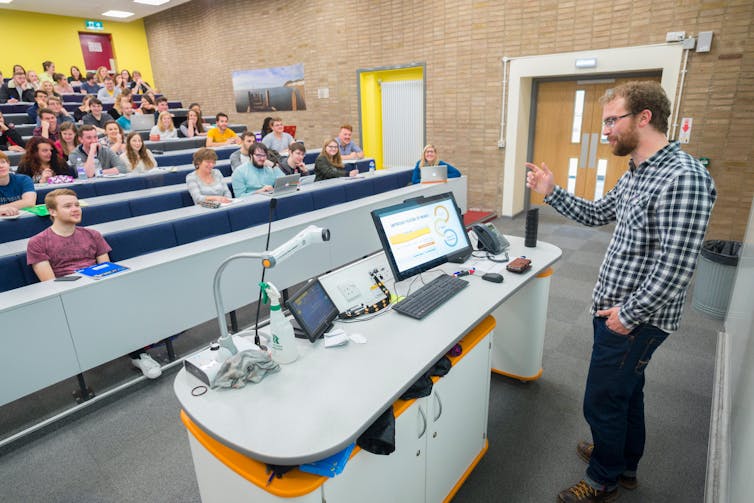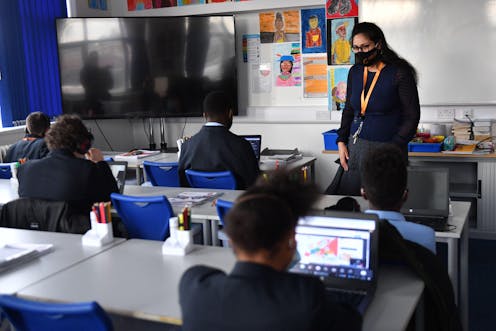The quality of any education system is highly dependent on the quality of its teachers. Research has shown how vital universities are in equipping teachers with the theory and the principles they need to do their jobs well.
In England, universities are currently responsible for 100% of initial teacher education (ITE) at undergraduate level and around 70% of postgraduate courses. And evidence from the Department for Education itself indicates that this approach works. Between 2018 and 2020, all the institutions that offer ITE were rated good or outstanding by Ofsted, the UK government’s quality assurance agency.
Despite this impressive record, a major review of ITE - or as the government prefers to call it, ITT (initial teacher training) - is underway. In July 2021, the department for education published the ITT market review report. The public consultation on its recommendations has been notably short.
This review continues a decade-long trend, shifting the responsibility for ITE away from universities and towards schools. Specialists have highlighted how selectively research has been used to justify this approach. The difference in nomenclature between the university label (ITE) and the government label (ITT) for how teachers are taught is not just semantic. It highlights a fundamental conflict of approach: should teachers be educated or trained?

Significant upheaval
Since Michael Gove was education secretary, the UK government has increasingly pushed for teacher training to happen in schools. The ITT market review is the latest in a series of attempts by the Department for Education to limit the role of universities.
This latest review makes several recommendations that are not based on national or international evidence. Teacher education specialists say they risk destabilising the sector and diluting the intellectual standing of the profession. For instance, if these reforms go through, they could potentially drive out prestigious universities, including the University of Cambridge and the University of Oxford.
Others cite serious concerns around university independence. The government wants any institution that trains teachers to go through an accreditation process for quality control - even those universities that have been doing it for years. Conversely, it would open up teacher training to multi-academy trusts and other groups of schools which have relatively little experience of training teachers, as well as training programmes, which have been criticised for framing teaching as a career stepping stone - and not a destination.
The changes the review suggests also risk placing more demands - and greater costs - on schools. Teaching staff who mentor student teachers on placement, for example, will see their workload doubled.
This review also recommends creating an ITE curriculum that all teacher-training institutions would have to follow. This threatens individual universities’ ability to respond to local needs. Currently, they can devise bespoke teacher education programmes which can make a difference in rural areas, coastal regions and areas of deprivation, where recruiting teachers is often challenging, though more research is required on this.
The Department for Education has, itself, admitted that it is moving quickly. This has also raised concerns. The review was concluded in six months, without any meaningful consultation with either universities or schools. It was published just as the summer term ended. And the public consultation was scheduled to last only seven weeks. The government’s own code of practice requires 12.
By undermining university involvement in ITE, the reforms will erode the intellectual basis of the profession - the very feature of high-performing education systems across the world. What then is this dispute between policymakers and education specialists based on?

Unrealistic expectations
Recent educational policy in England, much like in the US, has focused on universal educational excellence. It avoids acknowledging the impact systemic social injustice and structural inequality have on how well children do at school. Instead, it focuses on notions of “what works” and “best practice” in relation to teacher education.
The government’s approach draws a unidirectional line of influence from schools to society. It assumes that the former can compensate for any shortcomings in the latter, fostering undue and unrealistic expectations that schools and teachers are able to fix society.
The government prioritises what specialists call an “evidence-based”, “what works” approach to teaching teachers. This means that teachers are encouraged to make decisions about their pupils’ learning based on what has worked for others, but not necessarily on what the children in front of them actually need. They are discouraged from using their judgement. This focuses on what is taught in the classroom and how comes at the expense of critical considerations around why it is taught in the first place. As teacher education specialist John Loughran has noted, that “why” is what enhances pupils’ learning. And in its one-size-fits-all approach, the government fails to recognise the distinctive contributions that pupils bring to their own learning.
Several key organisations involved in ITE have issued statements challenging this review. They insist that the problems that the government has identified in the way teachers are taught could be resolved in collaboration with universities - not by excluding them.
Universities are well placed to make changes to the programmes they offer via existing internal (university programme review and validation) and external (Ofsted) quality-assurance processes. And they would do so in compliance with existing or amended government ITT criteria.
Crucially, universities have the established infrastructure, the extensive resources and the research expertise, that student teachers need. They encourage students to systematically interrogate research, policy and practice, including their underlying assumptions and assertions.
It is this perspective on education – informed by critical, historical and sociological expertise – that will best equip future teachers to adapt to changes throughout their careers. Universities have a proven record of working effectively in partnership with schools, too. They know how to enable student teachers to integrate the theory they learn in lectures with the practical experience they gain in the classroom to meet the needs of a diverse population. This needs to be built on, not dismantled.


